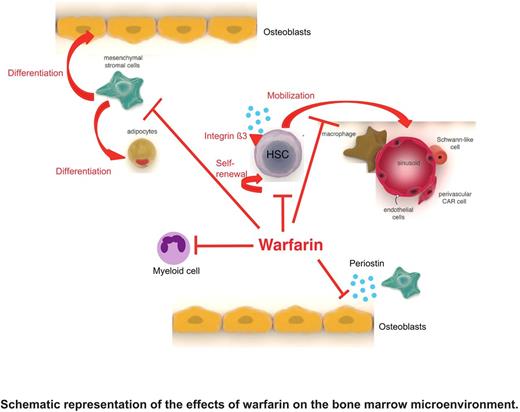Abstract
The coagulation system is a complex system comprised of various proteases and other factors which result in the formation of a blood clot, and proteases in general are known to regulate the mobilization of normal hematopoietic stem cells (HSC) from the bone marrow microenvironment (BMM). However, whether the proteases of the coagulation system are involved in the mobilization or maintenance of hematopoietic stem and progenitor cells (HSPC) is unknown.
Hypothesizing that the proteases of the coagulation system play a role in the normal physiology of the BMM and that modulation of coagulation factors may have an effect on HSPC, we tested the effects of the anticoagulant warfarin, used in 1% of people worldwide for prophylactic or therapeutic anticoagulation. Indeed, treatment of wildtype mice with warfarin led to a decrease in myeloid cells in peripheral blood, decreased HSC function and mobilization from the BMM and an almost 8 fold reduction of functional HSC. Intrafemoral co-transplantation of warfarin-treated, ex-vivo expanded primary murine bone marrow stromal cells with untreated HSPC led to decreased engraftment of HSPC compared to co-transplantation of vehicle-treated stroma cells suggesting that warfarin may compromise bone marrow stroma. We have implicated periostin, a vitamin K dependent factor produced by bone marrow stroma - binding to integrin β3 and signaling via AKT in HSC - as being the cause of impairment of hematopoiesis during treatment with warfarin.
In addition, warfarin treatment of NOD SCID interleukin-2 receptor gamma knockout (NSG) mice or intrafemoral cotransplantation of human warfarin-treated stroma cells and untreated human CD34+ HSC led to reduced engraftment of human CD45+ leukocytes. In corroboration of our murine data we showed that the total leukocyte and monocyte count, as well as the percentage of basophils and eosinophils were significantly reduced in 282 patients receiving warfarin and 89 patients receiving another vitamin K antagonist, fluindione, for anticoagulation compared to untreated healthy controls.
In summary, warfarin or vitamin K antagonism treatment impairs HSC function in humans and mice via modification of the BMM and, specifically, by the impairment of the periostin/integrin β3 axis, which we, thereby, implicate also for the maintenance of normal HSC.
Fontenay: Celgene: Research Funding.
Author notes
Asterisk with author names denotes non-ASH members.


